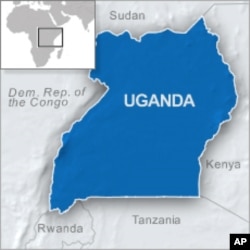The British charity Oxfam has released a new report detailing the forced eviction of people from forests in Uganda to make way for a British timber company. The Ugandan government denies the allegations, and says the numbers are exaggerated.
Oxfam says that between 2006 and 2010, more than 22,000 people were evicted in the Kiboga and Mubende districts of central Uganda as part of a “land grab” by the New Forests Company.
One of the co-authors of the report, Matt Grainger, says Oxfam became aware last year of concerns about the company's operations in Uganda.
“So when we talked to the people and we interviewed those people who had been evicted, their stories were absolutely consistent, and absolutely relentless," said Grainger. "They had been forced out of their homes, they lost their homes, their crops had been destroyed, they couldn't take their belongings, their homes were torched and they were left with nothing.”
Who is to blame?
The New Forests Company bills itself as being socially and environmentally responsible. It also claims to be the biggest tree planter in Uganda, where it harvests pine and eucalyptus trees, and plants other indigenous species as part of an environmental conservation effort.
The company says it currently has projects covering more than 20,000 hectares of land in the country.
Grainger says New Forests has denied any involvement in the evictions, saying that was the government's job.
“Now, for us, a company operating in a developing country like Uganda can't operate like it's 1961, it can't put all the blame on the government," said Grainger. "New Forests shares responsibility to ensure that people aren't worse off, that they're properly compensated.”
Exaggerated numbers
Uganda's National Forestry Authority (NFA), which ordered the evictions, says Oxfam's numbers are exaggerated.
NFA spokesperson Moses Watara says only 8,000 people were moved from the land, and that for the most part they went peacefully after given four months notice by the police.
Watara also says the New Forest Company's project was important enough to protect.
“We had to act because it was a big investment and these people had really started cutting the trees planted by the company, and yet it is saving the country a lot of money from importing poles, but also creating jobs and even they are building schools and roads for the community in that part of the country,” said Watara.
Encroachment
Watara says encroachment is one of the biggest problems facing the country, and that illegal foresting has contributed to landslides and other environmental degradation.
Oxfam says land grabbing is a global problem, and reports similar cases in South Sudan, Indonesia and Central America.
The group says the problem is made worse by increasing demand for cheap land to grow crops that can be used to make biofuels.




